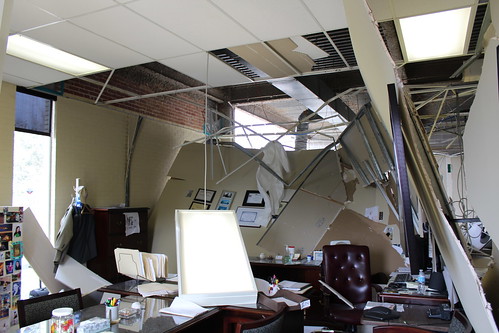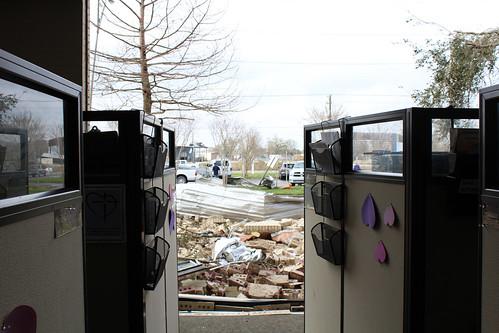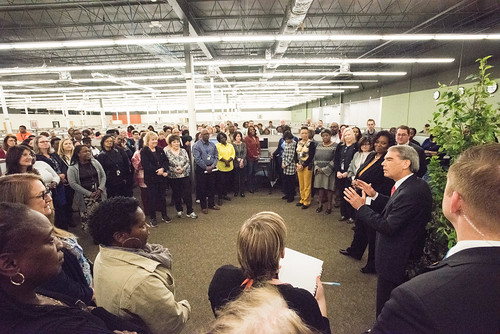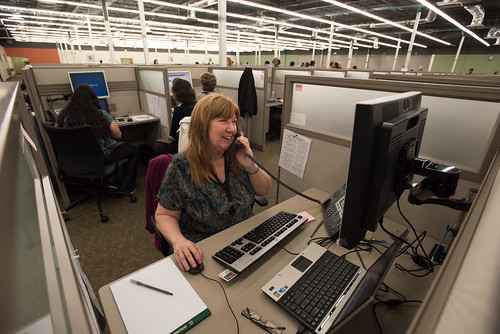
Within minutes of being notified of an impending storm, the employees of the US Department of Agriculture’s National Finance Center (NFC) in New Orleans felt the devastating impact of the EF-3 tornado that descend upon the two-story building with enough force to tear away whole sections of the brick façade in eight places and leave portions of its interior exposed to the elements.
“I could see it coming,” said Tara Gilliam, chief of Human Resources Management Staff. “It swallowed the building in a matter of seconds.”
Acting Deputy Director Michael Jackson saved countless lives by running down the halls to alert his coworkers of the incoming danger. He yelled for people to take cover before the pelting rain and heavy winds, reminiscent of the thunderous sound of a freight train, engulfed the NFC.
“It was scary, especially when the lights went out,” said Sharon Cannon, a supervisor and program analyst at the NFC. Cannon said they were in total darkness for a few seconds before the generators kicked in.
Though still standing after the tornado, whole sections of the exterior walls are missing, and various internal office spaces as well as a toilet in the second-story bathroom are now visible from the street. Post-storm assessment revealed the winds had ripped out floor tiles that had been previously glued down, blown out windows, and collapsed ceilings. Outside, cars were damaged beyond repair from flying debris that shattered windshields and scratched paint jobs. Fences were destroyed and swivel chairs, typically reserved for inside meetings, littered the ground after strong gusts blew them out of the building.

“With all that, amazingly, we didn’t have any serious injuries,” said Calvin Turner, Director of the NFC.
Through communications with the National Weather Service, Turner said they knew that there was enough of a lull in the storm to get the approximately 1,300 employees that work at the NFC into the cafeteria, which is equipped with storm shutters.
“After we got everyone safely bedded down and moved into the east side of the cafeteria, we needed to immediately execute the COOP plan, and that just went flawlessly,” said Turner.
The Continuity of Operations Plan, or COOP, is a contingency plan that provides guidance for what to do if a natural or man-made disasters impacts the NFC. Additionally, it allows for continued operations of the NFC’s mission, which is to process the payroll for more than 650,000 Federal employees across 172 agencies and provide payment to vendors, distribute block grants to States, and manage retiree benefits.
“We immediately told our folks to start deploying, and that message went out within an hour of the event,” said Turner.
NFC personnel train annually on implementing the COOP and within hours advanced teams were able to relocate to the alternate work site in Bossier City, near Shreveport, La., and resume business operations.
“The process has been smooth because we had all of our plans in place and everyone was able to pick up and get the job done,” said Aisha Bias, who is the current COOP Coordinator.

On Monday, Acting Agriculture Deputy Secretary Mike Young along with the USDA Acting Chief Financial Officer Lynn Moaney met with employees to express their gratitude and admiration for the hard work and personal sacrifice that has kept the NFC running.
“I wanted to say thank you,” said Young addressing a crowd of NFC employees. He stressed the work they do is incredibly important, and commended them for their ability to execute their COOP in an instant and still deliver on providing the vital services without interruption.
“I am was impressed to see how the New Orleans team dropped everything, leaving your families, to make sure the mission was carried out,” said Moaney talking to workers. “For that I owe each and every one of you a debt of gratitude for what you have done.”
“I keep thinking of the timeline,” said Young. “The tornado hit and within hours, folks were on their way up here, 350 miles from where they normally live and to get this place going. It was operating the next morning, and payroll happened for 650,000 employees, and on time!”
NFC workers are no stranger to disaster. The COOP was implemented 12 years ago when Hurricane Katrina hit New Orleans. Currently, there are about 182 employees deployed to Bossier City while approximately 300 others are teleworking. NFC leadership is working to find another facility closer to New Orleans to get the rest of the employees back to work.

